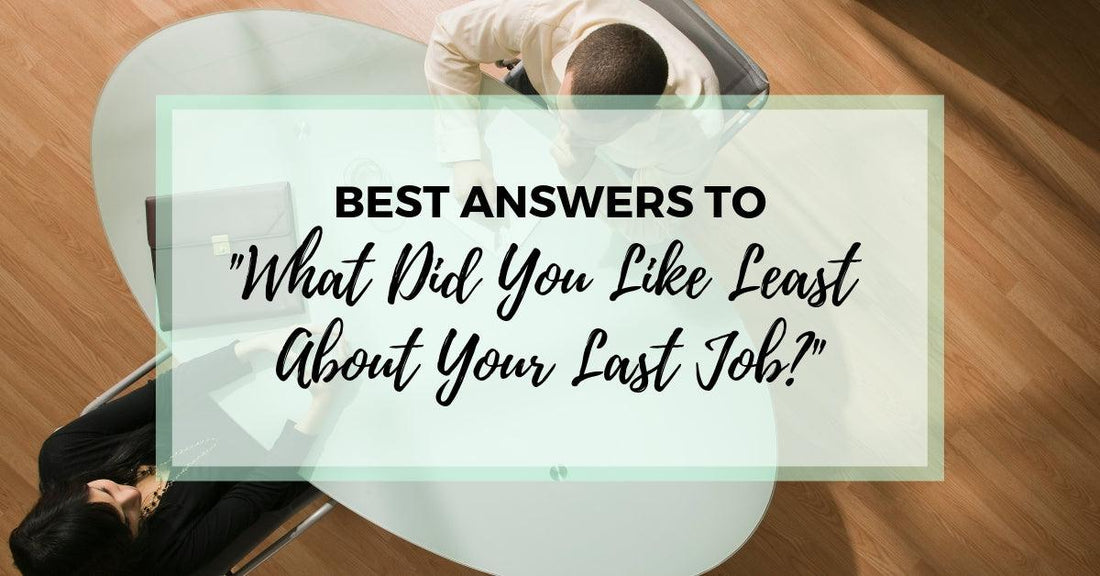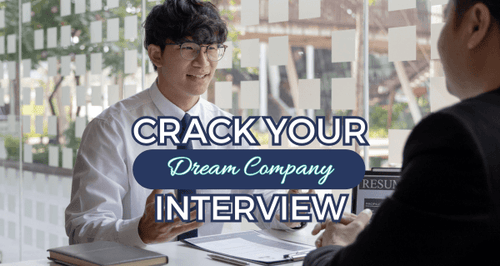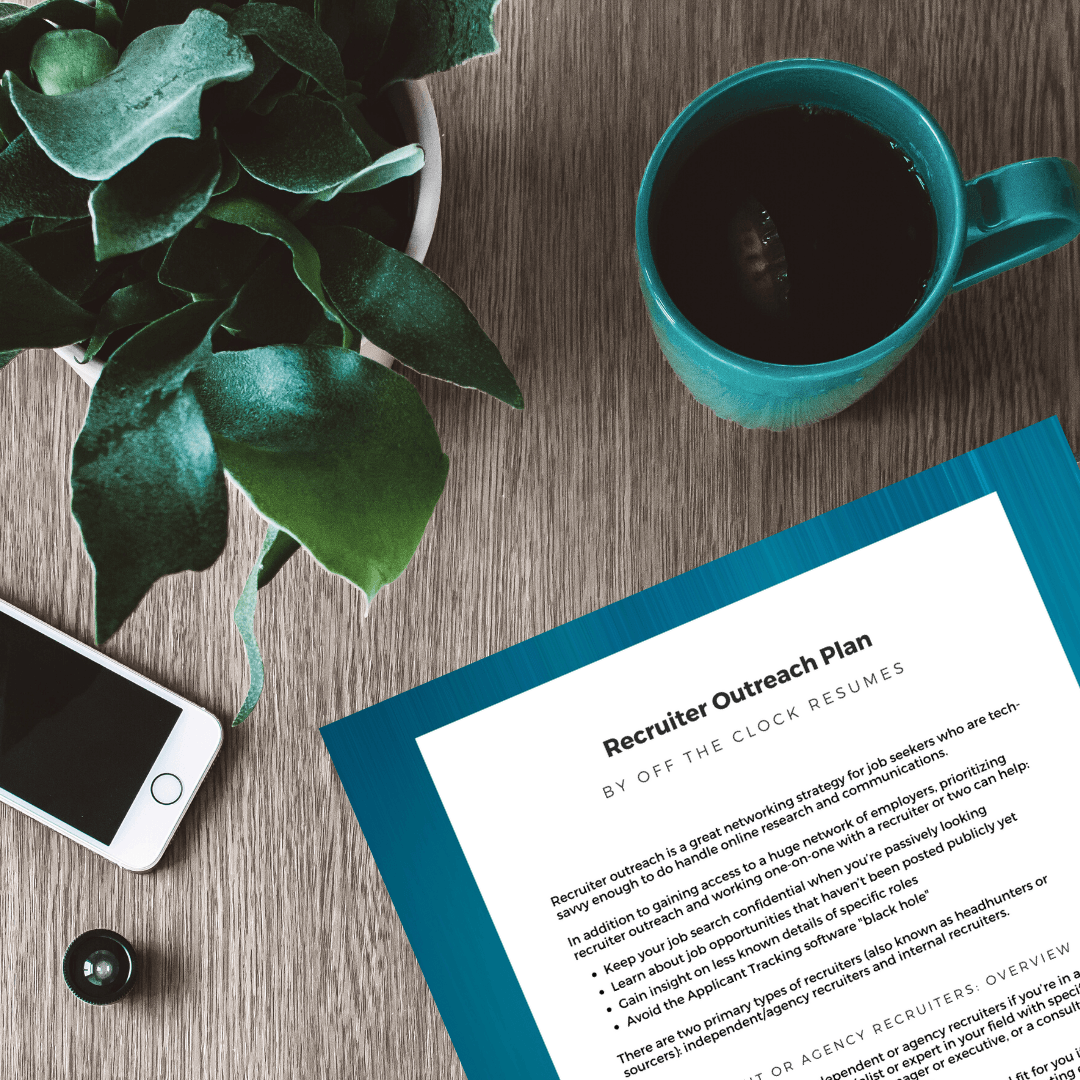
Best Answers to "What Did You Like Least About Your Last Job?"
The first rule of interviewing is to keep it positive. Keep your attitude positive. Keep your answers positive. This rule even applies to those negative questions.
You know the ones I’m talking about.
Negative questions are designed to probe at what kind of attitude you have and what your goals are. A few of the most common negative questions are:
- Why are you leaving your current employer?
- What is your greatest weakness?
- What would your last employer say you need to improve?
- Can you describe a time when you failed?
We're going to look at how to answer one interview question that can really catch you off guard if you aren’t prepared.

This blog contains affiliate links, meaning I may receive a small commission (at no cost to you) if you subscribe or buy something through the links I share. I only share links to products or services that I use myself or absolutely love!
Why This Question Is Asked
The reason may surprise you. "The reason an interviewer (especially a third-party recruiter) will ask that question is that we want to make sure we're going to place the job seeker into a job that will be a great one for them and last a long time," says Hannah Iranon, a Recruiter at Humanix.
Melissa Kuntzmann, SHRM-CP, the Director of Human Resources at Zak Designs, elaborates on this by stating, "We want to know how to add to your success; if something in the position we are potentially recruiting you for possesses any of those ‘least favorite’ things and we can't overcome that, then why would you want to move into another role with potential to also not be a great fit?"
That’s right; interviewers aren’t trying to corner you into bashing your current or previous employer. Interviewers are trying to make sure the job is a good fit for both the company and for you.
The Best Answers To This Interview Question
Here are the top three best answers to this interview question according to recruiters, hiring managers, and career services specialists!
The Job Itself Wasn’t A Good Fit
Sometimes job descriptions change. This is often the case when you realize your typical tasks have become mundane and not challenging enough. Instead of focusing on the negative side of why you’re seeking a new job, putting a positive spin on new and exciting opportunities is a great approach.
“I recommend approaching interview questions that are intended to uncover weaknesses, negative traits, or a dislike of certain job duties as positively as possible - with some ‘curated’ honesty thrown in that serves to make a point of why you're interested in the role at hand,” suggests Kimberley Nielsen, a Talent Services Lead and Technical Recruiter at Gun.io.
“For example, ‘After doubling my team in my last role, I suddenly found myself focusing a majority of my time on administrative and HR tasks, which started to eclipse the time I needed to spend on developing strategy and guiding my new team's output. This is why I'm very interested in this role in particular, which would allow me to focus on strategic initiatives and be more hands-on in guiding the performance of a smaller team.’”
Other times the job itself just wasn't a good fit from the start. When you feel absolutely lost and can’t understand why certain responsibilities are important or when you discover that your role isn’t actually aligned with your career goals may indicate a job-person fit issue.
Iranon claims, "Honesty with honor is the best policy in my opinion... So, honesty about what hasn't worked for them in the past and what they don't enjoy is always the best policy.”
You are the most successful when you play to your strengths. Interviewers know this, too. Answer honestly, with a positive spin, and focus on the areas you excel in to help employers connect the dots and see that you may be the best fit for this job.
The Work Style or Environment Wasn’t A Good Fit
There is nothing wrong with letting an interviewer know that the company culture wasn’t a good fit for you before. Maybe you're looking to work for an organization with particular values or with an association with a favorable charity. When a particular work style doesn't work for you, it may negatively affect your performance and curb your potential.
“If there was a specific job function that just didn't vibe with your work style or a process or style of work that added negativity to the workday, then share that with your future employer,” recommends Kuntzmann. “Don't hide what you dislike just to fit what you think the mold is."
It’s important to note that work style or environment isn’t referring to co-worker dynamic issues. In fact, it’s best to direct the conversation away from these tempting answers.
Amy Miller, a Senior Tech Recruiter at Google, shares, “It's also best, in my opinion, to focus on PROCESSES, not PEOPLE - for example, you wouldn't want to say ‘I hated the way our receptionist took messages; (s)he always forgot to get critical information.’ Instead, you could say, ‘Our process for messages was less than ideal. We had a live person take down written messages versus using voicemail, and sometimes we wouldn't receive full information.’ It’s even better if you follow it up with a suggestion for improvement or steps you took to help improve whatever it is you didn't like.”
You need the work style or environment to be a good fit to thrive, so stand your ground on areas of importance to you. Otherwise, you will ultimately waste both your and the interviewer's time.
Opportunities For Advancement Were Scarce
If your previous or current employer doesn’t offer many opportunities for advancement, such as regular promotions or specialized training, bring to the interviewer’s attention how important these are to you. Knowing your five-year plan, realizing the steps you must take to reach those goals, and articulating that this job is the next step will show your dedication to your career.
Keep in mind, hiring and training new employees is time-consuming and expensive. Interviewers are trying to find the best fit for the job because a good fit lowers the likelihood that you’ll be looking for yet another job in the next few months. Most employers are looking for ambitious, hardworking, results-driven candidates. This is an opportunity to shine!
The Worst Answer To This Interview Question
Your venting instincts may want to kick in, but it’s critically important not to verbally slam your former supervisor or employer.
“If it comes to talking about the leadership style of an ex-manager or the poor company culture, you want to phrase it in a way that is honoring at the same time,” advises Iranon. “No one wants to hire someone who bashes their last employer as it indicates they might do it to their future employer."
Miller agrees, “This isn't about that tired, old trick of trotting out a weakness as a hidden strength; it's being honest but framing in a way that doesn't cast blame.”
Related Articles
-

4 Personal Assistant Interview Questions and Answers
Guest blogger Liza Griffen, co-founder of Tyler Griffen, equips you with a deep understanding of typical interview questions and practical answers to help you showcase your skills effectively whether you're aiming to impress in your first personal assistant role or looking to step up in your career.
-

Crack Your Dream Company Interview
Guest contributor Nandkishore Rathi shares practical tips, strategies, and insightful advice from career experts to help you shine during written and verbal interviews.
-

Don't Panic: 15 Ways To Prepare For A Video Interview
Guest blogger Daniel Boyce with Aware Recruiter delves into 15 actionable steps to prepare you for a stellar video interview experience whether you're a seasoned professional or just stepping into the job market.
-

5 Signs That A Company Values Employee Wellness And Safety
Guest blogger Sharon Feldman shares how asking questions about wellness and safety in your interview could give you insight into a company’s values.
-

Preparing for Different Interview Formats: Phone, Video, and In-Person
Interview Coach Ellie Hoekman shares specific preparation steps for phone, video, and in-person interviews.
-

How To Ace Your Interview With A Staffing Agency
Guest blogger William Powell shares how to prepare adequately for an interview with a recruiting agency to increase your chances of landing your dream job.
-

5 Things You Need To Know About Job Interviews To Succeed
Guest blogger Marcus Ralph shares 5 tips on what you can do before a job interview to be best prepared to make a solid first impression and land the job.









